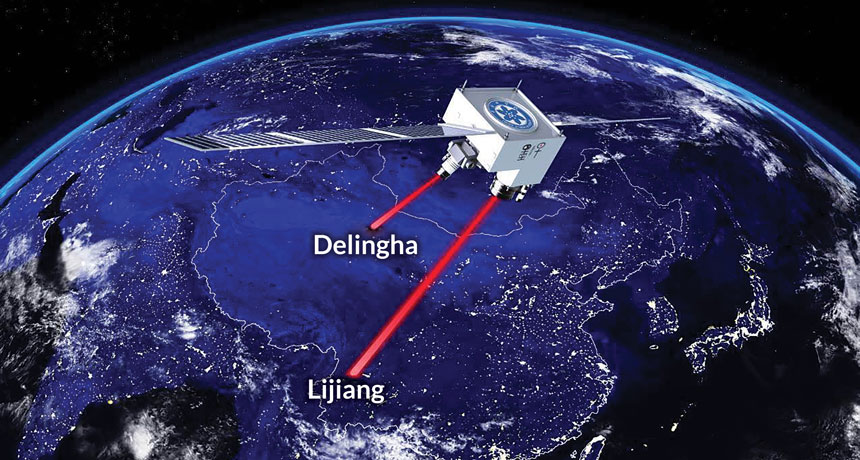Scientists are spaced out. Chinese researchers sent quantum information from a satellite to earth, a breakthrough in the development of an unhackable quantum internet. What does this mean for Delft’s efforts in this field?
Using the quantum-communications satellite Micius (illustrated), researchers successfully sent entangled photons to two cities in China. The result paves the way for a future worldwide quantum network. Illustration: Science News
Just four weeks ago TU Delft was king of the castle. In a Science article, published June 2nd, researchers from QuTech and colleagues from the University of Oxford described a technique to make quantum repeaters, which are presumed to be fundamental for a future unhackable quantum internet.
Hardly had the ink of the Delft/Oxford article dried, than scientists at the University of Science and Technology of China in Shanghai had their Science article published. In the article, they describe how they used a satellite to send quantum information through space.
The Asians are now at the centre of attention. Media around the world talk about ‘a landmark study and a giant step for the quantum internet’ ( Scientific American), a study that ‘shatters entanglement record’ (Science News Magazine).
Both groups are working towards new methods to design an internet based on quantum entanglement and photons. Theoretically, this type of internet should be unhackable.
As the light particles travel through air or fibre, the information encrypted in photons –the most promising quantum information carriers – degrades rapidly. Both groups are working on tackling this problem.
‘Once you have satellites distributing your quantum signals throughout the globe, you’ve done it‘
Delft researchers set their sights on quantum repeaters: combining multiple weak quantum links into one stronger one.
The Chinese believe the solution lies in outer space: by sending information through near vacuum, the signals are not disturbed.
Place your bet. Delft or Shanghai?
Science magazine seems to have put its cards on the Chinese. “Quantum repeaters that rebroadcast quantum information aren’t yet mature”, the magazine wrote in an editorial.
“Many physicists have dreamed instead of using satellites to send quantum information through the near-vacuum of space.”
The article continues with a quote from Verónica Fernández Mármol, a physicist at the Spanish National Research Council in Madrid: “Once you have satellites distributing your quantum signals throughout the globe, you’ve done it. You’ve leapfrogged all the problems you have with losses in fibres.”
‘The Chinese technique is sensational, but has limitations too’
Peter Humphrey, of QuTech, is one of the authors of the Delft/Oxford publication. “It is not this or that”, he says. “What the Chinese have done is sensational and I suspect satellites will become an important part of the future internet. But their technique has limitations too. They succeeded in sending information from A to B through space, not in sending it to many different nodes.”
“In order to send information in all directions you need repeaters. Maybe like the ones we are working on. Who knows, one day satellites might be carrying our repeaters and form the infrastructure of the internet.”
According to the Delft researcher both efforts are complimentary approaches to increasing both the distances between and the number of different places that can be joined together in a quantum network.
The weird limbo of superposition
The research that lead to the Science article on quantum repeaters was carried out by Ronald Hanson’s group at QuTech. This group is renowned for designing networking links based on quantum entanglement.
In 2015, in a sophisticated experiment, Hanson’s group measured entangled electrons 1.3 kilometres apart, showing once and for all that entanglement is real and that it could be used for hack-proof communications.
Read more about how the quantum internet works, entangled objects and the weird limbo of superposition that exists in the quantum world in the Delta article Hanson team proved Einstein wrong.
Do you have a question or comment about this article?
tomas.vandijk@tudelft.nl


Comments are closed.